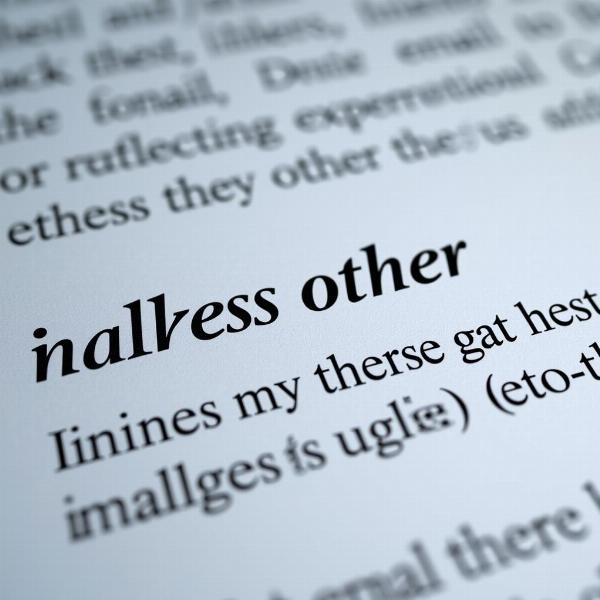The phrase “unless otherwise” is frequently encountered in legal, contractual, and formal documents. Understanding its meaning is crucial for accurate interpretation. This article delves into the meaning of “unless otherwise” in Hindi, exploring its various applications and providing practical examples to solidify your comprehension. We’ll also examine common Hindi equivalents and how they are used in different contexts.
Decoding “Unless Otherwise”
“Unless otherwise” essentially means “except if something different happens” or “if not stated differently.” It introduces a condition that, if met, negates the preceding statement. Think of it as a caveat, an exception to the general rule. This phrase is designed to provide flexibility and cover unforeseen circumstances.
For example, “The meeting will be held on Monday unless otherwise notified.” This implies the meeting is scheduled for Monday, but this could change if a notification stating a different date is issued.
Hindi Equivalents of “Unless Otherwise”
Several Hindi phrases convey the meaning of “unless otherwise,” each with its nuances. Some common equivalents include:
- जब तक अन्यथा न कहा जाए (jab tak anyatha na kaha jaaye): This is a direct translation, meaning “until otherwise stated.” It’s often used in formal settings.
- अगर कुछ और न हो (agar kuchh aur na ho): This translates to “if nothing else happens,” implying a change in circumstances.
- विशेष परिस्थितियों में छोड़कर (vishesh paristhitiyon mein chhodkar): This phrase means “except in special circumstances,” highlighting exceptions to the rule.
Choosing the appropriate Hindi equivalent depends on the specific context and the desired level of formality.
Practical Applications of “Unless Otherwise”
Understanding “unless otherwise” is particularly important in legal and contractual documents. It clarifies responsibilities and obligations, leaving no room for misinterpretation. For example, a contract might state, “The payment is due on the 15th of every month unless otherwise agreed upon.” This allows for flexibility in payment schedules based on mutual agreement.
Using “Unless Otherwise” in Business Communications
In business communications, using “unless otherwise” demonstrates professionalism and clarity. It allows for contingencies and ensures all parties are on the same page. For example, “The project deadline is December 31st unless otherwise specified in the project proposal.” This ensures everyone understands the default deadline while acknowledging the possibility of adjustments based on the project proposal.
 Using "Unless Otherwise" in Business Emails
Using "Unless Otherwise" in Business Emails
Conclusion
“Unless otherwise meaning in hindi” encompasses several nuanced phrases that convey the idea of exceptions and conditions. Understanding these phrases and their applications is crucial for clear communication and accurate interpretation of legal, contractual, and formal documents. By using the appropriate Hindi equivalent, you can ensure your message is precise and avoids ambiguity.
FAQ
- What is the most formal Hindi equivalent of “unless otherwise”? जब तक अन्यथा न कहा जाए (jab tak anyatha na kaha jaaye) is considered the most formal and direct translation.
- Can I use “unless otherwise” in informal conversations? While not incorrect, it’s less common in casual conversations. Simpler alternatives might be preferred.
- Why is it important to understand “unless otherwise” in legal documents? It clarifies potential exceptions and prevents misunderstandings about obligations and responsibilities.
- What are some other examples of “unless otherwise” in sentences? “The shipment will arrive on Tuesday unless otherwise delayed.” “The meeting will be virtual unless otherwise arranged.”
- Is there a difference between “unless otherwise stated” and “unless otherwise agreed”? “Stated” implies a unilateral declaration, while “agreed” implies mutual consent.
- What is the significance of “unless otherwise” in business contracts? It provides flexibility and allows for adjustments based on mutual agreement or changing circumstances.
- Can “unless otherwise” be replaced with “if not”? “If not” can sometimes be used, but “unless otherwise” is generally preferred in formal contexts for its clarity and precision.
Meaning-Hindi.in offers professional translation services specializing in legal, business, technical, and academic documents. We ensure accurate and culturally sensitive translations between Hindi and other languages. Our expertise includes website localization, certified translation, and expedited translation services. For high-quality Hindi translations, contact us at [email protected] or call +91 11-4502-7584. Meaning-Hindi.in is your trusted partner for all your Hindi translation needs.